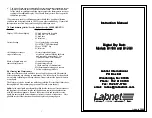
48
12 Fine tuning
The factory default settings and the APC routine will provide acceptable performance for
most boats, but each boat has different steering characteristics and some fine tuning may
be necessary for optimum performance.
For individual settings referred to below, see the setup section.
The tests should be performed under fairly calm sea conditions with minimal wind or tide. If
wind or tide are unavoidable, set a course for minimum effects from these causes. It is
recommended that these sea trials should not be done in restricted or busy waters.
Step by step instructions how to fine tune the Autopilot:
1. Check that Dockside Testing, Sea Trials including the APC routine has been done. If not,
go back and make sure they are done.
2. Activate the Autopilot on a course and ensure that it holds without excessive
understeering or oversteering.
3. With the boat travelling in a straight line at its normal cruising speed in calm water,
activate the Autopilot compass function. Make a 40
°
course change using the
LEFT
or
RIGHT
and the boat should not overshoot by more than 3
°
to 4
°
. Continue making 40
°
course changes while adjusting the Rudder [RUD] setting until the boat overshoots the
correct course a few times prior to setting on the course. This is the optimal [RUD] setting
that can be used on the boat at the current cruising speed and load, in calm waters.
4. Continue making 40
°
course changes while slowly increasing the Counter Rudder [CRD]
setting, until the boat settles onto course with only one overshoot of 2
°
to
3
°
or less. On
some boats, the [RUD] setting may have to be decreased by one position to get the boat to
control properly. The [RUD] and [CRD] settings are set to the maximum combined settings
that should be used on the boat at that speed and under the existing sea conditions.
The [RUD] and [CRD] settings may need to be increased in rough weather. The higher the
[CRD] setting relative to the [RUD] setting for calm weather, the less it will need to be
increased in rough weather. As the boat's speed decreases, the rudder becomes less
effective.
The [RUD] and [CRD] settings may need to be increased as the speed decreases. The
higher the [CRD] setting relative to the [RUD] setting, the less it will need to be increased at
lower speeds.
To find the optimal [RUD] and [CRD] settings at different boat speeds, or when the boat is
towing, follow the procedures outlined in #3 and #4 above. Make a record of the different
settings needed to control the boat at all typical speeds, loads and weather conditions
normally experienced. Due to the wide dynamic control range and self tuning features of
the microprocessor control, settings determined for cruising speed in calm seas may be
found acceptable without further change at slower speeds and in heavier seas.
FINE TUNING


































